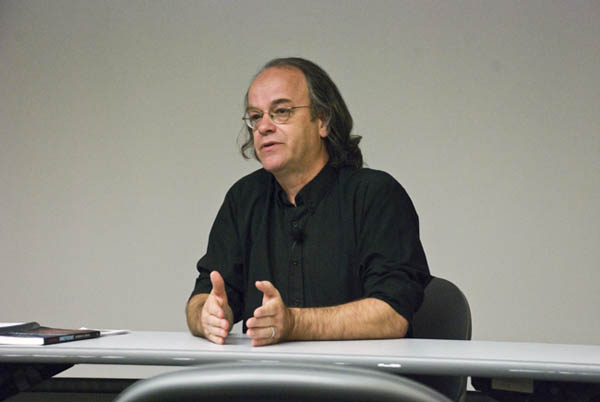For the final event of Native American Heritage Month at NMU, the Native American Student Association (NASA) brought Kevin Annett to campus. His film, “Unrepentant: Kevin Annett and Canada’s Genocide,” was shown in Jamrich on Tuesday, Nov. 16. An open discussion with Annett followed the film.
Annett is a former United Church minister in Vancouver, Canada. He was fired without cause in 1995 and expelled from the church without due process after discovering evidence of the murder of native children at the United Church residential school in Port Alberni, British Columbia. He also uncovered information revealing the theft of native land by church officers.

Since first unearthing this information, Annett has been determined to find more evidence, to draw attention to the issue and to hold those involved accountable for their actions. He has written two books on the subject, “Love and Death in the Valley” and “Hidden from History: The Canadian Holocaust.” In order to put a human face on the issue, Annett made “Unrepentant.”
“Unrepentant” brings together two narratives: the story of the genocide that occurred against natives in Canadian residential schools and Annett’s own journey of learning of these events and struggling to draw attention to them.
In residential schools throughout Canada, thousands of Indian children were sterilized, intentionally infected with tuberculosis and smallpox, murdered and buried in mass graves. The schools forced Native parents to sign over guardianship of their children, so these events were allowed to go on unreported for many years.
Annett has lost family, endured lawsuits, battled a smear campaign, and been physically attacked for spreading this information and encouraging victims and witnesses to speak up. He says that the negative responses are coming from white people who are in denial about the genocide and Native people who are implicated by the investigation.
Despite the problems he has encountered, Annett said he remains determined.
“We have to take responsibility for the crimes of the past so they don’t happen again,” Annett said. “This involves the survival of all of us. If it can happen to one group, it can happen to any of us. These crimes are continuing, so you can’t just look the other way.”
Following the film on Tuesday, students and community members took advantage of their opportunity to speak with Annett. Along with expressing heartfelt sentiment and gratitude toward Annett and his work, people asked questions and shared their own stories.
A local native told of his experience in American boarding schools. He said he saw children experimented upon and murdered, much like the atrocities that Annett exposed.
In addition to the public film showing and discussion, Annett spoke to several classes on Monday, Nov. 15 and Tuesday, Nov. 16. He said he believes students can play a valuable part in raising awareness for this and similar tragedies.
“I think students have a big responsibility, because they have the time to be able to look into this stuff, the ability to think about it,” Annett said. “That responsibility means they have a big role to play in terms of doing the research and getting the word out.”
Andrew Sear, who is going for his M.S. in training, development, and performance improvement, attended the film and stayed for the discussion as well. He had previous knowledge of native residential schools from NMU classes.
“I enjoyed Kevin’s perspective on the topic of residential schools, Sear said. “He made me feel his compassion and sense of justice in his movie. The discussion that followed really opened my eyes to the local issues that may still exist within our Native population in the U.S.,” Sear said.
In order to bring Annett to campus, NASA students composed a grant to the Student Finance Committee and received the funding. The Ethnic and Cultural Diversity Committee and academic departments including history, education, and academic information systems, also backed Annett’s visit.
April Lindala, director of the Center of Native American Studies, supported NASA in its efforts to bring Annett to campus.
“Kevin Annett brings light, not only to the atrocities of residential schools in British Colombia, but the message that this type of imposed genocide was federal policy and that people knew about it and did nothing,” Lindala said.
Lindala, who currently teaches NAS 204 and NAS 448, said she shares Annett’s message with her classes.
“I ask my students, try to think about yourself in that position,” Lindala said. “Think about what it would be like if you couldn’t speak English, if you could never see your family again … think about if you had to practice a religion that was different, maybe even hostile to your own,” Lindala said.
























